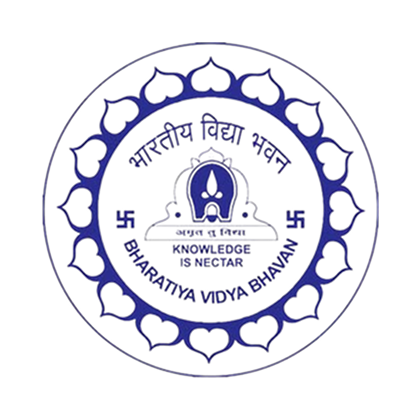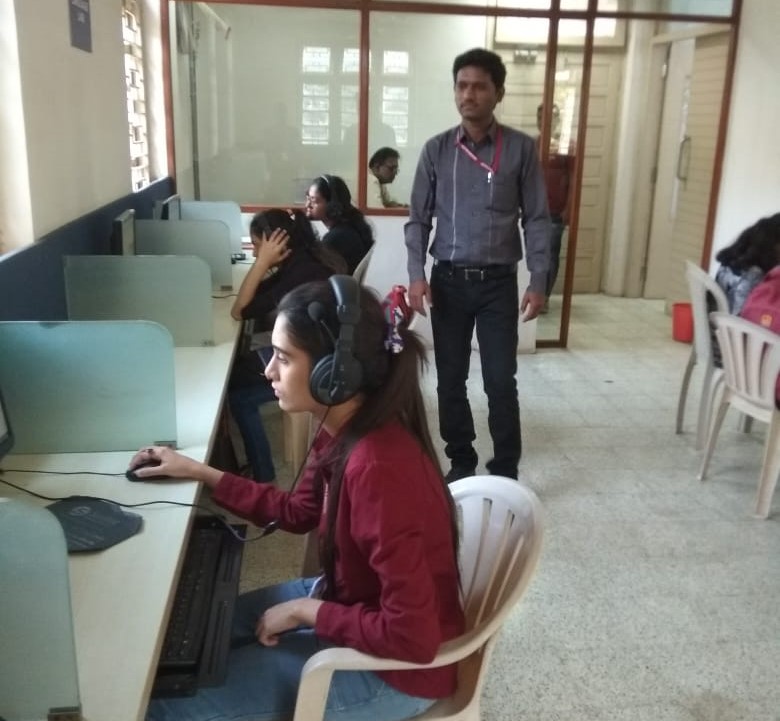
BHARATIYA VIDYA BHAVAN'S
M. M. College Of Arts, N. M. Institute Of Science, H. R. J. College Of Commerce
Bhavan’s College
(Autonomous 2020-30)
Established in 1946 | Re-accredited "A" Grade by NAAC | Munshi Nagar, Andheri (W), Mumbai - 400058
The Department of English in Bhavan’s College (Autonomous) came into existence along-with the establishment of the college in the year 1946. It is continuously working on a mission to create passion for English Language and literature studies among its learners. It offers specialization in English Literature with six core subjects and three subjects in combination with Psychology or Philosophy. It organizes various student-centric and subject-oriented activities throughout the academic year for the altruistic development of the students of the college. It functions as per the requirements of the time to provide ample development of communication skills and imparting human values among learners. The most of the literary activities are conducted through a literary club ‘The English Athenaeum’ aiming to provide a home platform to instill positive values among students through the mode of literature and English language learning.

The English Athenaeum:
The Department conducts various literary activities under this literary association throughout the year as a home platform.
Memorandum of Understanding:
Memorandum of Understanding is signed between Department of English, Bhavan’s College Autonomous and Department of English, Dr. Tatyasaheb Natu College, Margtamhane, Chiplun-Ratnagiri for educational, literary faculty-student exchange, research, rural-urban fusion in higher education.
|
Sr. No. |
Category |
Name |
Designation |
|
1. |
Head of Department |
Dr. H. L. Narayana Rao |
Chairperson |
|
2. |
Internal Faculty |
Dr. C. B. Patil |
Member |
|
3. |
Internal Faculty |
Dr. Sunil K. Gondhali |
Member & Secretary |
|
4. |
Subject Expert Nominated by the Academic Council outside the parent university |
Dr. Uttam Ambhore Professor & Head, Department of English, Dr. Babasaheb Ambedkar Marathwada University, Aurangabad. |
Member |
|
5. |
Subject Expert Nominated by the Academic Council outside the parent university |
Dr. Pandurang Barkale Head, Department of English, SNDT University Arts & Commerce College, Churchgate Mumbai. |
Member |
|
6. |
One Expert nominated by Vice Chancellor |
Dr. Lakshmi Muthukumar SIES College of Arts, Science & Commerce (Autonomous), Sion (W), Mumbai 400 022 |
Member |
|
7. |
One Representative of industry/corporate/allied area relating to placement |
Mr. Snehdeep Fulzele Authored’DIE POOR OR LIVE RICH’published by CNBC. |
Member |
|
8. |
One Post-graduate meritorious alumnus nominated by principal |
Dr. Shweta Salian Assistant Professor, Department of English, Mithibai College, Vile Parle (W), Mumbai |
Member |
|
9. |
Co-option by HOD with approval from principal |
Dr. B. N. Gaikwad (I/c Registrar, University of Mumbai), Vice-Principal & Head, Department of English, Acharya Marathe College, Chembur, Mumbai. |
Member |
|
10. |
Expert from outside the college when special courses of study are to be formulated |
Dr. (Mrs.) Shalini R. Sinha Vice-principal, KC College, HSNC University, Mumbai. |
Member |
|
11. |
Expert from outside the college when special courses of study are to be formulated |
Dr. Suresh D. Sutar Assistant Professor, Department of English, Dr. Tatyasaheb Natu College, Margtamhane, Chiplun-Ratnagiri. |
Member |
| PO | A student completing Bachelor’s Degree in Arts program will be able to: |
|---|---|
| PO-1 |
Apply knowledge and experience to foster personal growth and better appreciation of the diverse social world in which we live. |
| PO-2 |
Communicate competently through writing, reading, speaking, and to be able to connect to the world in a meaningful way. |
| PO-3 |
Acquire knowledge in the field of social sciences, literature and humanities which make them sensitive and sensible citizen |
| PO-4 |
Develop a knowledge base sufficient to appear for various competitive examinations or choose the post graduate program of their choice |
| PO-5 |
Develop awareness for human values to enable them to deal with various problems in life with courage and humanity. |
| PO-6 |
Increase their understanding of the culture and art and contribute to the society by being able to generate solutions for social, political issues at Individual and societal level. |
| PSO | A student completing Bachelor’s Degree in B.A. program in the subject of English will be able to: |
|---|---|
| PSO-1 |
Explore their creative imagination, attain good writing abilities, and have effective communication skills which will be able to help the students to excel in their life. |
| PSO-2 |
Cultivate the habit of developing their creative language capabilities in tune with the skills required for the business world. |
| PSO-3 |
Enable employment opportunities as reporters, correspondents, copywriters, technical writers, or corporate bloggers etc. |
| PSO-4 |
Inculcate an enthusiastic response to continue higher education and become an author or a writer or opt for careers in media, advertising, teaching, and academia field. |
| PSO-5 |
Create a curiosity to study a variety of literature, socio-cultural, and political issues concerning contemporary English Literature. |
| PSO-6 |
Develop within our students all-round skills in communication, critical thinking, analysis, and persuasion in life. |
FYBCOM: Business Communication
Semester-I & II: After successful completion of the course, the learner should be able:
FYBA: Communication Skills in English
Semester-I & II: After successful completion of the course, the learner should be able:
FYBA: English Ancillary-I: Introduction to English Literature
Semester-I & II: After successful completion of the course, the learner should be able:
SYBA: Business Communication
Semester-III: After successful completion of the course, the learners will be able:
Semester-IV: After successful completion of the course, the learners will be able:
SYBA: English-II: Indian Literature in English
Semester-III: After studying the syllabus, the learners will be able to:
Semester-IV: After studying the syllabus, the learners will be able to:
SYBA: English-III: American Literature
Semester-III: After successful completion of the syllabus, the learners will be able:
Semester-IV: After successful completion of the syllabus, the learners will be able:
TYBA: English-IV: 16th to 18th Century English Literature
Semester-V: After studying the syllabus, the learners will be able to:
Semester-VI: After completion of the course, students are expected to be able to:
TYBA: English-V: Literary Criticism
Semester-V: After completion of the course, students are expected to be able to:
Semester-VI: After completion of the course, students are expected to be able to:
TYBA: English-VI: Grammar and Art of Writing
Semester-V: After completion of the course, students are expected to be able to:
Semester-VI: After completion of the course, students are expected to be able to:
TYBA: English-VII: 19th Century English Literature
Semester-V: After completion of the course, students are expected to be able to:
Semester-VI: After completion of the course, students are expected to be able to:
TYBA: English-VIII: 20th Century British Literature
Semester-V: After completion of the course, students are expected to be able to:
Semester-VI: After completion of the course, students are expected to be able to:
TYBA: English-IX: Literature and Gender
Semester-V: After completion of the course, students are expected to be able to:
Semester-VI: After completion of the course, students are expected to be able to:
The College has successfully launched the Department’s English Language Lab with 10 PCs in Library Building for the benefit of students of the college in 2019. Orell Techno Systems (India) Pvt. Ltd., Kakkanad, Kochi provided ICT Enhanced Communicative English Program Language Laboratory 2.0 Smart Version (The ELT Studio) on lifetime perpetual license basis from the year December 2019. It has authorized one teacher and 20 consoles at a time up to a total of 500 user capacity. The Department faculties started taking tutorials and some introductory session using this facility after its launch.
